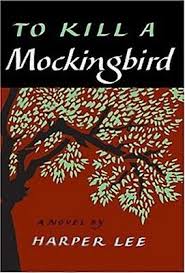
To Kill A Mockingbird, by Harper Lee, is a book that has been banned from schools and libraries. I think that is a fairly recent occurrence. I recall being assigned to read this book as part of my English class work when I was in high school. The concepts presented in this book are as relevant today as they were when it was originally published (in 1960).
This book is a fictional story told from the viewpoint of a little girl who goes by the name of Scout. She lives with her big brother Jeb, her dad (who both the children call Atticus) and a maid named Calpurnia. Atticus is a lawyer, and he has just been appointed to defend a “colored” man who has been accused of raping a white woman.
The town is small and southern, and the story takes place just before WWII started. The town has a very hard time dealing with the possibility that this man could be innocent, and many people make life difficult for not only Atticus, but also his children.
Scout is at an age where she is just trying to figure things out. What does rape mean? Why are people mad at Atticus for defending this man, when everybody knows he was assigned to the job? Why do women have to wear dresses and act “lady like”? Why can’t she just wear the overalls she likes better? Why do people treat others badly when they think they are different from themselves?
She is a smart kid, and has a lot of spirit. Scout is also trying to figure out just what happened to their mysterious neighbor, and why no one sees him. What did he do?
She, her brother, and a good friend spend a lot of time trying to get “Boo” Radley to come outside. They are too innocent to realize they might be bothering him. This book is about tolerance, and about having respect for other people. It is about standing up for what you know is right, even if it’s difficult or unpopular to do it.
People tend to ban this book specifically because the “n word” is used. Some feel the book is degrading towards African Americans. It has been claimed that this book encourages segregation, or, at least, suggests that different races are not equals.
Others want to ban this book because it deals with the subject of rape, and also because it implies that the woman who was raped might also be a victim of domestic abuse, or even incest, from her father.
Often, people cite these reasons to prevent a school or teacher from using this book in a classroom situation. It is as though the people who want to ban this book are interested in discouraging young people from asking tough questions, engaging in critical thinking, and discussing situations that really do still happen today. To me, this is a tragedy. We should be teaching and encouraging those skills!
There are so many good things in this book that you miss out on if you don’t read it. The main character is a strong, confident, powerful little girl, who stands up for what she believes in. Not too many books show strong girls, particularly when you think about books published in 1960.
Atticus encourages both his children not only to read, but also to think. Schools today do promote literacy, but too few value children who can think for themselves, who can argue well, and who can use what they have read in their arguments. It’s refreshing to have that viewpoint expressed.
This book points out that it’s not what people look like that matters, it is the kind of person that they are that makes the difference. People deserve respect, but this is in relation to how they treat other people. Many examples of this concept are given through the book, and its woven into the story very well.
This book doesn’t make its points in an overt “After School Special” kind of way. It is a book for people who like to think, and the ideas expressed are just as relevant today as when the book was first written.
This book review of To Kill a Mockingbird – by Harper Lee is a post written by Jen Thorpe on Book of Jen and is not allowed to be copied to other sites.
If you enjoyed this blog post please consider supporting me on Ko-fi. Thank you!
